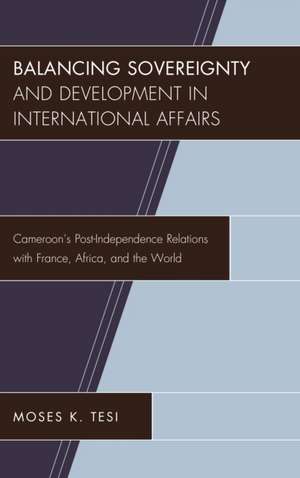Balancing Sovereignty and Development in International Affairs
Autor Moses K. Tesien Limba Engleză Hardback – 30 aug 2017
Balancing Sovereignty and Development in International Affairs is about Cameroon, a minor power in world affairs, and her foreign policy and international relations, especially as she deals with major powers, in this case, France. It emphasizes Cameroon's economic and political relations with France, her relations with Francophone Africa, Anglophone Nigeria during the Nigerian Civil War of 1967-1970, the hot button issues of African liberation, and the development challenges that she faced. The study probes the nature, scope, depth, dynamics, and drivers of Cameroon's foreign policy to understand its logic, and to uncover the consequences to the country's development and sovereignty. It also investigates and sheds light on some conventional views about Cameroon's relations with France--the view that Cameroon is a French puppet. The above questions are investigated within the theoretical framework of dominant-dependent- compliant behavior in world politics. Put differently, as a minor partner in her relations with France, was Cameroon being unduly exploited to France's benefits or not? If not, what were Cameroon's benefits in the relationship? And if so, what were the benefits to France? The case study method, supplemented by rich statistical time series analysis, source-tracing and interviews were used to uncover patterns and common themes in Cameroon's foreign policy behavior and to systematically document her economic dependence on France and assess if such dependence also generated political consequences for Cameroon in its behavior towards France. Part One of the book discusses the historical origin of the modern Cameroonian state, the domestic context of its foreign policy, post-independence politics, and challenges associated with nation-building, national independence, domestic security, and economic development, that underlay the country's world view and guided her international behavior. This part also analyzes Cameroon's economic relations with France focusing on trade, investments, and aid, revealing that France dominated the Cameroonian economy in all three sectors, explaining what accounted for such dominance, and what Cameroon tried to do to alleviate the situation. Part two focuses on case studies of critical foreign policy challenges that Cameroon faced, and how she reacted to French interests and pressure.
Preț: 685.85 lei
Preț vechi: 890.72 lei
-23% Nou
131.25€ • 136.25$ • 109.44£
Carte tipărită la comandă
Livrare economică 24 martie-07 aprilie
Specificații
ISBN-10: 149853063X
Pagini: 238
Dimensiuni: 152 x 229 x 24 mm
Greutate: 0.52 kg
Editura: Rowman & Littlefield
